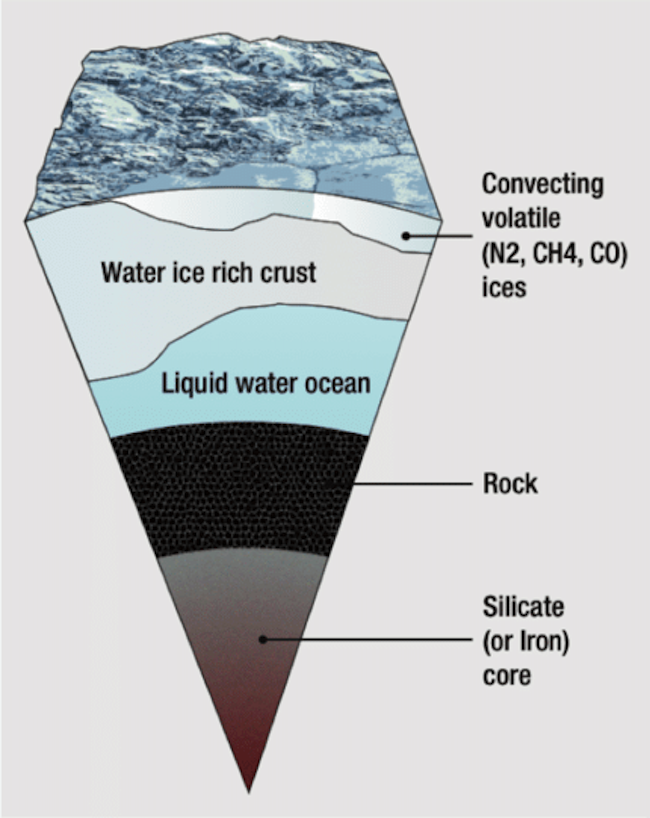- Pluto is tiny and far from the sun. You wouldn’t expect it to have liquid water.
- But scientists believe Pluto does have an ocean, beneath a thick shell of ice. The evidence came from the New Horizons spacecraft’s sweep past Pluto in 2015.
- New research – released in May 2024 – suggests Pluto’s ocean is a little saltier and denser than seawater on Earth. If you could take a dip, you would float easily, scientists said. Cracks and bulges in the Sputnik Planitia impact basin provided the clues as to the salinity and density of the ocean.
A salty ocean on Pluto
The outer solar system, where Pluto orbits, is sometimes referred to as a deep freeze. It’s an icy and desolate place, with Pluto itself so far from the sun that – from its vantage point – the sun looks like a bright star. Yet Pluto is thought to have a liquid ocean beneath its icy crust. That makes Pluto similar to some moons in the outer solar system, such as Europa at Jupiter or Enceladus at Saturn. NASA’s New Horizons mission discovered evidence for Pluto’s subsurface ocean when it flew past this world in 2015. This month (May 21, 2024) researchers released more details about the ocean hidden under Pluto’s crust. They now believe it’s a little denser, or saltier, than seawater on Earth. If you could take a dip, they said, you could float upon it easily, much as you can float easily in exceptionally salty seas on Earth, such as the Dead Sea.
Alex Nguyen at Washington University in St. Louis in Missouri, and Patrick McGovern at the Lunar and Planetary Institute in Houston, Texas, published their new peer-reviewed findings in the journal Icarus (Science Direct/ Elsevier) on February 15, 2024 (finalized version).
Peering into Pluto’s ocean
Pluto’s ocean is well hidden below a thick outer crust of nitrogen, methane and water ices. We will never be able to see it from a spacecraft. But New Horizons’ instruments were still able to detect the ocean far below the surface. Nguyen and McGovern used that data to find further clues about the nature of the ocean. Indeed, the discovery was a bit of a surprise for planetary scientists. Most calculations before New Horizons had suggested any ocean inside Pluto should have frozen soon after Pluto itself formed and quickly cooled. Nguyen said:
Pluto is a small body. It should have lost almost all of its heat shortly after it was formed, so basic calculations would suggest that it’s frozen solid to its core.
Subsequent studies using data from New Horizons then suggested Pluto did indeed have an ocean. The paper stated:
The existence of a subsurface water ocean on Pluto has been inferred on numerous grounds. The characteristics of such an ocean are vital inputs for various types of models that are carried out to illuminate the interior structure and evolution of Pluto, especially in light of the complementary relationship between the dimensions of the ocean and an outer water ice shell.
Sputnik Planitia
The new study focused on the huge impact basin called Sputnik Planitia. This basin forms part of the famous heart formation on Pluto and features many cracks and bulges in the ice. A huge meteor impact created the basin billions of years ago. Nguyen and McGovern created mathematical models to try to explain the formation of the cracks and bulges.
The results supported other studies, pointing to a subsurface ocean of water beneath the basin. They estimated the ice shell above the ocean to be 25 to 50 miles (40 to 80 km) thick. It is that impressive ice shell that prevents the ocean from completely freezing.

You could float in Pluto’s ocean
The findings also provide more information about the salinity, or density, of the ocean. As it turns out, it’s not too different from Earth’s oceans. The study suggested Pluto’s ocean is only about 8% saltier than seawater on Earth, at most. That’s similar to the Great Salt Lake in Utah. If, somehow, it was possible to actually get into the ocean, a person could easily float in it.
The cracks on the surface of Sputnik Planitia provided clues about the density. As the paper described it:
The density of Pluto’s interior ocean affects the stress state in the icy shell above.
If the ocean was less dense than it is, there would be many more fractures, with the ice shell collapsing. On the other hand, if it was denser, then there would be fewer fractures than what they observed. As Nguyen noted:
We estimated a sort of Goldilocks zone where the density and shell thickness is just right.
Bottom line: A new analysis of data from NASA’s New Horizons mission shows Pluto’s ocean is just a little denser than seawater on Earth. You could easily float in it.
Source: The role of Pluto’s ocean’s salinity in supporting nitrogen ice loads within the Sputnik Planitia basin
Via Washington University in St. Louis
Read more: How Pluto got its heart
Read more: Ripples on Pluto hint at subsurface ocean